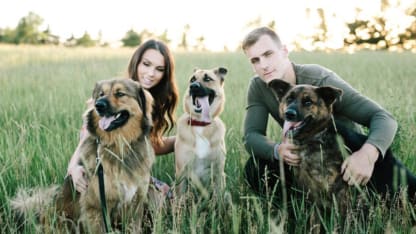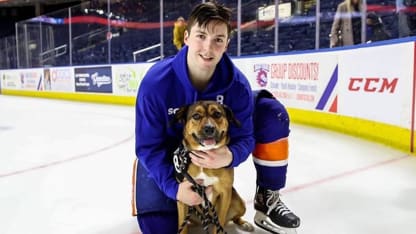Back in Brandon, Manitoba, Ryan Pulock's home often serves as a halfway house for rescued dogs.
Pulock estimates he's had up to 10 or 15 dogs living in his house at once, if only for a night or two. His girlfriend, Paige Friesen, who is the driving force behind the rescue effort, said she's taken as many as 30, at times kenneling them in her parent's heated barn while they wait to be transferred to open rescues or new homes.
Rescue Mission
Ryan Pulock and his girlfriend Paige Friesen are rescuing dogs in Manitoba

"We always end up with a foster dog or cat," Pulock said over the offseason, when he and Friesen housed additional animals, including a pregnant cat. "We had puppies for a couple of weeks a little while ago that ended up going to the shelter... There's always dogs and cats coming through our house until they can find another place to go. There's always something new going on."
It's a big commitment, but rescuing animals is a cause that Pulock and Friesen believe in, so sharing their home with abused and unwanted cats and dogs is a small sacrifice.
Friesen currently volunteers at Pawsitive Communities, a mobile pet care program affiliated with the Brandon Humane Society, situated in the Western Manitoban town where Pulock played his junior hockey. Friesen now works as a nurse, but she's volunteered with the Humane Society for over eight years and rescuing animals is her passion.
"You see the unwanted, sometimes badly treated and neglected animals come in and it really just pulls at your heartstrings," Friesen said. "Seeing the suffering in a living thing, it's awful. It's the most heartbreaking thing to see something suffer. So it's about wanting to help them out and stop the suffering."
Instagram from @rpulock: Who doesn't love dogs #nationaldogday #rescuedogs @paige\_friesen\_
The overpopulation of dogs in Manitoba is why Friesen has brought her work home with her, but housing the animals is no small effort. The dogs need to be kept in a clean room or garage and some even need to be quarantined given the mangy state they find some of the dogs in. That's why the barn is advantageous. They evaluate the dogs after a few days to see if they can interact with the other rescues, or the couple's three German Shepherds.
"We set up our garage, or a room in our house where everything is kept at bay and kept clean," Friesen said. "That's a big thing too, these dogs aren't healthy when they come in, they're skinny and mangy and just keeping everyone healthy, and safe, and quarantined. I'm lucky that way that I had my parents barn to keep them in, and keep everybody separated and under control, but it is completely overwhelming, it's a lot of work."
The stories of how they find these dogs is heartbreaking. They're abused, malnourished and alone in places like dumps, or tied up and left outside in the harsh elements of the Canadian prairies. The dogs are skittish, skinny and often distrust people, so they'll run away or even bite when the Humane Society tries to approach them to help.
"Sometimes you come across them and they are within a day or two of probably dying because they are that unhealthy," Pulock said.
Pulock and Friesen have three dogs of their own, Jonah, Joshy and Cujo - all rescues - and each one has its own heartbreaking origin story.
"We have three of our own and they are all rescued," Pulock said. "The first one we got has like no teeth, he was very badly abused and beaten. Once they get that second chance, they are amazing, they are so thankful for people feeding them every day."
Joshy, their second dog, had lived in a dump for six weeks and was so desperate for food it had tried eating balloons. They rescued him before he starved to death and today he's a healthy German-Sheppard cross.
"Seeing the light come in their eyes… they became the sweetest, nicest, most friendly, loyal dogs," Friesen said. "It's amazing to be able to give them a second chance."
Instagram from @rpulock: Currently fostering these two babies, both were rescued starving living in a dump eating balloons. Now they are happy and healthy. #adoptdontshop 🐾
They can't take in all the stray, abused or neglected dogs in Manitoba, but they can at least find them homes with other likeminded, compassionate people. The answer isn't always logistically easy. The explosion of unwanted dogs in Manitoba outnumbers the shelters and rescues in the area, so Friesen forged a connection with a shelter in Kelowna, BC, a few years ago, offering a refuge where they send the dogs to be sheltered and adopted.
They don't often get to see the end result of their work, or how the dogs fare once they find loving homes, except for one case that involved a Bridgeport Sound Tigers teammate.
Kyle Burroughs, the Sound Tigers captain, took notice of what Pulock and Friesen were doing and wanted to get involved back in 2017. He contacted Friesen and she had a rescue looking for a home. Burroughs jumped at the opportunity and that's how he wound up with Sadie, a Boxer Lab and Rhodesian Ridgeback mix.
"We call her a Heinz 57 dog, because she's a little bit of everything," Burroughs said.
Burroughs may not know the exact mix of his mutt, but he knows the conditions Sadie was living in; barely surviving at the dump on a reserve in Manitoba. Friesen took Sadie in first until she could get her shots and was old enough to cross the border and eventually flew the dog down to Burroughs in Bridgeport. Burroughs called Friesen a saint for making the trip - and for welcoming Sadie into his life.
"Adopting is a huge thing that I believe in and something people should get on board with," Burroughs said. "I made that a priority for myself and seeing what Paige does made me think and really pushed me to adopt. The fact that she does all of this out of her good will, inspired me a little bit."

Burroughs echoed Friesen's sentiment that these dogs may come from a troubled past, but are just as good as any other dog, once they find the right situation.
"I knew with my first dog, I wanted it to be a rescue dog and I can't say that I'd ever change that now considering how good of a dog she is," Burroughs added. "You meet any rescue and all of them have issues and things in their past that obviously came up. An opportunity for them to have another chance is big and for me, I can't see myself ever not giving a dog a second chance from a shelter."
Friesen's work and volunteering have kept her largely in Brandon while Pulock was in Bridgeport. She still stays there but visits Long Island frequently. Regardless of where she is, there are limits on what Pulock can do during the season to help, but Friesen sees value in his platform as a pro hockey player to spread the message about adoption and fostering pets in need. Pulock helped promote a mobile vet clinic on social media over the summer.
"It's amazing what education does. People just don't understand how much animals suffer in real life," Friesen said. "The fact that this is being put out there is phenomenal and just encouraging people to spay and neuter animals so there aren't so many unwanted animals that end up neglected or suffering to death."
She's grateful to see the Islanders put out Pucks and Paws calendars in each of the past four seasons. The first calendar raised money and awareness for North Shore Animal League, a Long Island-based pet rescue.
This year's calendar will benefit America's VetDogs
.
"I obviously see so much value in that and it's a way of reaching out and almost, not teaching people compassion, but showing people what amazing things other living things can do and how rewarding it can be to help other amazing things," Friesen said. "Seeing the Islanders advocating for any living thing, dogs, cats, it's nice to see that support come from an influential base."
Instagram from @rpulock: Awesome day spent with @pawsitivecommunities making a difference in many animals lives by spay/neutering and vaccinating! #spayandneuter #adoptdontshop
This past summer Pulock and Friesen were back home in Manitoba and the Isles defenseman continued to help his girlfriend in her cause, which has expanded to mobile vet and spay and neuter clinics. Two vets and a few vet techs drive around to underserved communities offering medical help. The spaying and neutering helps control the population, which should cut down on the amount of dogs left in macabre situations.
"It's a never-ending problem in certain communities, but at the same time, I think over the years here there's definitely more awareness," Pulock said. "Even if they can't really help the dogs themselves then they are contacting us or other rescues to help the animals… When you're going to these communities and fixing 40 dogs on a weekend or whatever it might be it definitely helps with the population so that they don't keep reproducing. I think some communities that they've been to really see the benefits. Hopefully, we can continue to do that to wear the problem continues to decrease."
It's not the most glamorous way to spend an offseason. Even keeping puppies at the house bring responsibilities like feeding, treating for fleas, rehabilitating them after vet visits and socializing them. But Pulock and Friesen find it to be rewarding work - and without it, they wouldn't have their three dogs, or have changed the lives of many others.


















